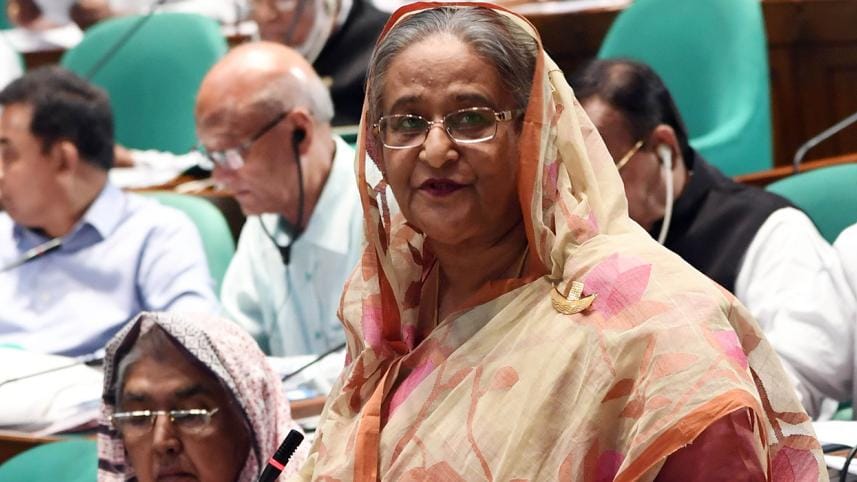No scope for long-term stay of Rohingyas in Bangladesh

Prime Minister Sheikh Hasina yesterday told parliament that Bangladesh will place its proposals on the future action plans over the Rohingya crisis in different multilateral meetings during the upcoming 73rd United Nations General Assembly (UNGA).
"We will hold talks with important world leaders over the issue at the sideline meetings of the UN General Assembly," she added.
In reply to lawmakers' queries, Hasina said she had placed a five-point proposal at the 72nd United Nations General Assembly in resolving the Rohingya problem, immediately after ethnic atrocities against Rohingya started on August 25, 2017, which the international community accepted cordially.
Mentioning that Bangladesh provided shelter to 1.1 million Rohingyas, the PM said, "Their stay in Bangladesh has created risk of human trafficking, drug smuggling and other organised crimes."
"The displaced Rohingyas have created a huge negative impact on local communities and ecology in Cox's Bazar," she said, adding that the risk of environmental disaster has emerged due to deforestration in the reserved land and cutting hills.
Besides, the possibility of breakouts of diphtheria, polio and HIV and other communicable diseases has appeared, she also said.
The premier said Bangladesh allowed influx of forcibly-displaced Rohingyas keeping the border open, responding actively to the unprecedented humanitarian crisis.
She, however, said, "There is no scope for long-term stay of Rohingyas in Bangladesh. We want to repatriate them within the quickest time."
Hasina, also leader of the House, said safe, respectful and sustainable repatriation of Rohingyas to their homeland will be possible as a result of the Awami League government's diplomatic efforts.
She said the Rohingya crisis first started in Myanmar 1978-'79 when the influx of Rohingya began to Bangladesh. But the crisis continued due to failure of the then military ruler in handling the problem.
In reply to a supplementary question from treasury bench lawmaker Dhirendra Debnath Shambhu from Barguna-1, Hasina said Bangladesh experienced influx of Rohingya again in 1980s.
Later, several lakh Rohingyas entered Bangladesh in 1991 and 1992 during the BNP government. Though Bangladesh could repatriate some Rohingyas through talks with Myanmar, some of them remained in Bangladesh, she said.
"But our [Awami League government's] diplomatic success is that we could create international opinion that Rohingyas were victims of injustice and it is duty of Myanmar to let them go back to their own country," said the prime minister.
She said the International Criminal Court also has taken measures to try those who are involved in persecution against Rohingya. Bangladesh has provided all information to the ICC regarding the issue.
During her talks at the recent Bimstec summit, the president of Myanmar said they would take Rohingyas back. "They [Myanmar] have also acknowledged it," Hasina said.
"I hope Myanmar will be forced to take them back in the face of international pressure," she added.
Responding to another supplementary question, the prime minister said, "We had talks with all countries and all acknowledged that the stay of 1.1 million Rohingyas is a huge burden for Bangladesh."
She said, "We've got good response from all countries including China, Russia and India over putting pressure on Myanmar. Though they did not put pressure overtly, they told us that they would take all necessary measures so that Myanmar takes Rohingyas back."
Responding to star-marked questions, Sheikh Hasina told parliament about her government's various measures regarding bringing development to the country's communication sector, armed forces, reducing traffic congestion, combating militancy, terrorism and corruption, and welfare for freedom fighters.
 For all latest news, follow The Daily Star's Google News channel.
For all latest news, follow The Daily Star's Google News channel.
Comments